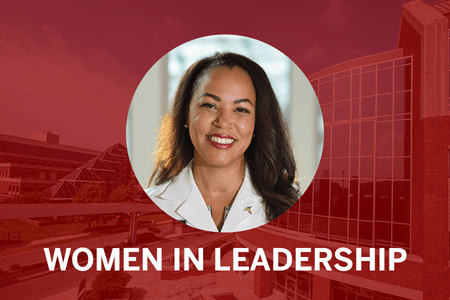Chemen Neal, MD, tries not to give advice. Although her perspective is highly valued by many at Indiana University School of Medicine and beyond, Neal understands that advice is rooted in one’s own experiences, making it impossible to remove biases.
What she’s learned to do instead is coach.
“I want to be someone who can listen and walk next to an individual and maybe shine a light in an area they’re not noticing—maybe give another perspective so they can work through what it is they want for themselves,” said Neal, who was recently named IU School of Medicine’s first Executive Associate Dean for Diversity, Equity, Inclusion and Justice (DEIJ) and Chief Diversity Officer. “If you know what your passion and purpose is, you come from a strong place. That’s your compass.”
As an obstetrician and gynecologist (OB-GYN), a physician leadership coach and a champion for diversity in academic medicine, Neal is passionate about helping others achieve their potential. In her new role, she aims to help guide the entire IU School of Medicine community into its full potential as a leader in health equity and inclusive excellence.
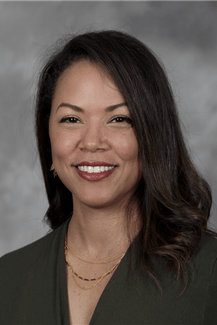 It’s a big job, but Neal brings years of experience working in this space. She previously served as assistant dean for student success and advocacy, and she has served as co-chair of the IU School of Medicine Diversity Council since 2015. During the 2020 national racial reckoning and protests of systemic racism, Neal not only provided guidance to school leadership on addressing issues of DEIJ but also provided space for people who were hurting and traumatized, said Alvaro Tori, MD, senior associate dean for diversity affairs.
It’s a big job, but Neal brings years of experience working in this space. She previously served as assistant dean for student success and advocacy, and she has served as co-chair of the IU School of Medicine Diversity Council since 2015. During the 2020 national racial reckoning and protests of systemic racism, Neal not only provided guidance to school leadership on addressing issues of DEIJ but also provided space for people who were hurting and traumatized, said Alvaro Tori, MD, senior associate dean for diversity affairs.
“In addition to her expertise on DEIJ, Dr. Neal brings a communication style that is inviting and effective,” Tori said. “The work around DEIJ is difficult, and not everyone starts from the same place. Dr. Neal is provoking, but in a way that brings people in and makes them want to learn more and take responsibility for their actions and behaviors. That is what makes her a very effective leader.”
Ironman: Taking on the impossible
Overcoming historical biases and systemic racism to achieve true equity and inclusion in an academic medicine institution might seem like mission impossible. But Neal has learned to break down complex goals. It’s a skill she not only practices professionally but also in her personal time, training as a triathlete.
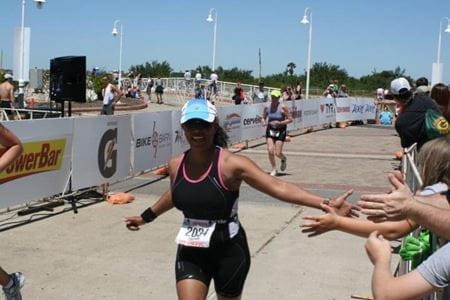 Ironman competitions are a new endeavor for Neal, who completed her first 140.6-mile swimming, biking and running event in November 2022 and was proud to finish. Aiming to improve her speed and overall fitness, Neal has two half-Ironman events scheduled later this year and plans to do another full Ironman in 2024. She blocks out time for training and considers it equally important to anything else on her calendar.
Ironman competitions are a new endeavor for Neal, who completed her first 140.6-mile swimming, biking and running event in November 2022 and was proud to finish. Aiming to improve her speed and overall fitness, Neal has two half-Ironman events scheduled later this year and plans to do another full Ironman in 2024. She blocks out time for training and considers it equally important to anything else on her calendar.
“I get practice achieving something I don’t think is possible for me,” Neal explained. “It is a way to practice self-compassion, consistency, commitment, productively overcoming failure and breaking down a big, scary goal into small, manageable chunks. Those are all the challenges I have faced and will continue to face as a leader.”
Neal wasn’t an athlete growing up and didn’t even start exercising until age 36. Part of the appeal of triathlons is the opportunity to be outdoors. Ironman events always involve open water, and many are held in places with scenic mountain views—which reminds her of home.
Neal faced adversity at a young age. Her mother died in a car accident when she was 11. That’s when she moved from the mountainous village of Pecos, New Mexico, to San Diego to live with her father, a senior chief in the U.S. Navy.
Although neither of her parents worked in medicine, it was her mother who first planted that seed for Neal. She recognized her daughter’s love for animals and suggested she become a veterinarian. Over the years, Neal cared for many pets including dogs, cats, chickens, rabbits and lizards. She also “adopted” a horse on a friend’s New Mexico ranch.
In high school, she visited a San Diego veterinary clinic through a career exploration program. She hated it.
“My idea of vets was different out in the country in New Mexico where they come out and see animals on a ranch,” Neal said.
But as her thoughts of becoming a veterinarian dwindled, she started taking interest in human health care, thanks to an attentive nurse practitioner whom she visited frequently.
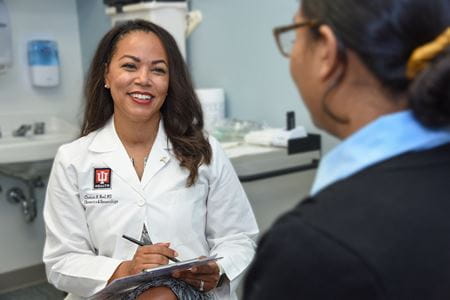 “Being a teenage girl with a dad as your only parent can be challenging, and so I had this wonderful nurse practitioner whose office taught me all the things,” Neal recalled. “I used to go in there a lot. It was weird, but I would just make appointments all the time for whatever, mostly just to talk. I realized I wanted to do that—I wanted to be a women’s health doctor.”
“Being a teenage girl with a dad as your only parent can be challenging, and so I had this wonderful nurse practitioner whose office taught me all the things,” Neal recalled. “I used to go in there a lot. It was weird, but I would just make appointments all the time for whatever, mostly just to talk. I realized I wanted to do that—I wanted to be a women’s health doctor.”
Neal would go on to become the first specialist in the state of Indiana to treat women with recurrent vaginitis—a condition that disproportionately affects Black and Latinx women—opening the state’s only clinic specifically for that condition at the Coleman Center for Women at IU Health University Hospital.
“I wanted to help these patients, so I invested time in learning,” Neal explained. “I developed expertise and started presenting at meetings to educate my peers because we don’t teach this topic very well. I developed a national reputation, and colleagues started sending people to me, so my patient population shifted from referrals. Now we have the only office in the state with a clinic just for this.”
First-Gen experience fuels Neal’s passion
The path to becoming a physician wasn’t easy for Neal, who was the first in her family to attend college. She is grateful for mentors throughout her educational journey, first at San Diego State University, followed by medical school at the University of Chicago Pritzker School of Medicine and a residency in obstetrics and gynecology at IU School of Medicine, where she joined the faculty in 2011.
“My work ethic comes from my dad and my family—they are really successful in working their way up and getting promoted in their jobs,” she said. “But they felt I was wasting my time going to college—they didn’t understand my time commitment or view school as hard work.”
 When Neal had her first child during her time at San Diego State, her family advised her to quit school and go to work. She persevered, choosing to listen to her own voice.
When Neal had her first child during her time at San Diego State, her family advised her to quit school and go to work. She persevered, choosing to listen to her own voice.
“I leaned on other people in the educational space who could see what I was trying to do and took advantage of programs for first-generation students,” said Neal. She also sought out mentors. “So many people filled in for my family in roles my family wasn’t capable of filling at different times in my life.”
At San Diego State, she was part of a program funded by the Howard Hughes Medical Institute focused on minority biomedical research success, and she helped start the Black Students in Science organization. While presenting her research at a conference, Neal impressed a group of educators from the University of Chicago, who recruited her for medical school. She was the first female medical student to enter that program with a child.
“I learned you are the best judge of what you can handle,” Neal said.
Seeing & supporting the potential in others
Neal’s experiences undergird her passion for developing programs to support faculty and trainees who come from historically marginalized populations.
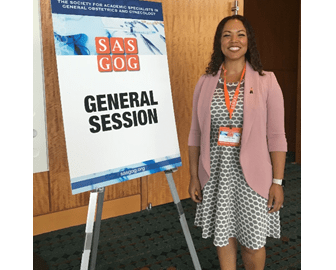 “I took advantage of a ton of programs, and all of that shaped who I am,” she said. “I know there are other people out there who have a similar experience and have so much potential, but they just need support to realize that potential. That’s my foundation. I strongly believe that everybody deserves to have the tools they need to be successful.”
“I took advantage of a ton of programs, and all of that shaped who I am,” she said. “I know there are other people out there who have a similar experience and have so much potential, but they just need support to realize that potential. That’s my foundation. I strongly believe that everybody deserves to have the tools they need to be successful.”
In her role with Student Affairs at IU School of Medicine, Neal launched the Leadership and Academic Development Scholars Program (LEADS), a cohort-based academic success and professional coaching program designed to address the barriers to success faced by learners from historically disadvantaged populations. She also expanded a pre-matriculation program offered to first-generation, URiM and other students at risk of struggling academically. Participants in the month-long program learn study strategies, make campus connections, begin to form their professional identities and, in the long run, outperform peers of similar demographics who do not participate in the pre-matriculation program, said Emily Walvoord, MD, associate dean for student affairs.
“She’s proven in her two years on the Student Affairs team that she delivers results,” Walvoord said of Neal’s collaborative leadership. “She brings the right people together to develop new programs that really make a difference.”
Mychael Spencer, a first-year medical student and president of the Class of 2026, said LEADS was pivotal in acclimating him to medical school as he shifted from a 10-year career in education with Indianapolis Public Schools.
“Dr. Neal continues to be an excellent resource,” Spencer said. “She continues to push me to reflect on my values and how to leverage those values as a medical student and future physician.”
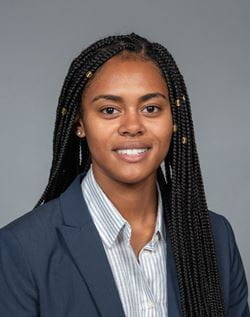 Lauren Turner also credits Neal and the LEADS program for preparing her for success in medical school and beyond.
Lauren Turner also credits Neal and the LEADS program for preparing her for success in medical school and beyond.
“I would have to say the biggest thing I have learned from Dr. Neal is when you know who you are, there is nobody and nothing that can take that away from you,” Turner said. “In addition, don’t be afraid to be unapologetically you and hold fast to your values. Oftentimes, I feel there are numerous influences that force us to go against our personal values, but she has shown that it is very possible to maintain your values and still have incredible levels of success.”
Neal is passionate about faculty development and retention of diverse talent. A certified executive coach, she launched The White Coat Project to help physicians become transformational leaders in their institutions. At IU School of Medicine, Neal has led Woman-to-Woman workshops for underrepresented female medical students, residents, faculty and staff, and she formerly served as director of wellness for the Department of Obstetrics and Gynecology.
“If you invest in people and give them the tools they need, they will run with it,” Neal said. “I always want to be a part of something like that.”
Leading the way in DEIJ
By creating an executive associate dean position specifically for advancement of DEIJ, IU School of Medicine has solidified its commitment to being a national leader in this space, Neal said.
“I think our school leads in a lot of ways,” she said. “I’ve been part of different national consortiums for DEIJ, and I am often pleasantly surprised to hear we are doing what’s considered to be the best practices for many areas like recruitment, our honor code and in creating an inclusive environment.”
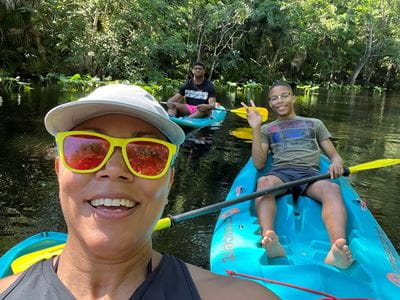 Looking forward, Neal sees a need for continued emphasis on diversification of the medical school’s faculty and trainee populations. Research shows vulnerable patient populations experience better outcomes when their health care providers come from similar backgrounds or have similar lived experiences, she noted.
Looking forward, Neal sees a need for continued emphasis on diversification of the medical school’s faculty and trainee populations. Research shows vulnerable patient populations experience better outcomes when their health care providers come from similar backgrounds or have similar lived experiences, she noted.
While Neal won’t tell someone what to do, she has a way of provoking and facilitating uncomfortable conversations—needful catalysts for personal and institutional transformation, say her colleagues and mentees. “Dr. Neal truly embodies what it means to ‘prepare healers and transform health,’” Turner said.
“Whether through the LEADS program, coaching or mentoring, she has demonstrated how an institution can create space to support and cultivate a diverse community. I don’t think you could find a better person who truly cares and is beyond capable of doing the work required to enable IU School of Medicine to become a more diverse and inclusive space.”
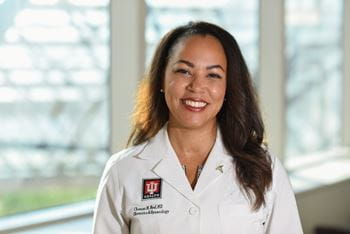 ABOUT THIS SERIES
ABOUT THIS SERIES
Women are leading the way in helping Indiana University School of Medicine fulfill its mission to advance health in the state of Indiana and beyond by promoting innovation and excellence in education, research and patient care. The Women in Leadership series celebrates the contributions of women who have emerged as strong leaders within the medical school and in their respective fields of expertise.
